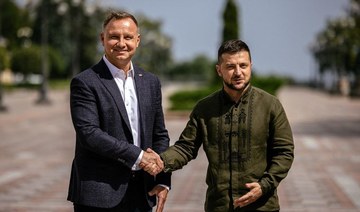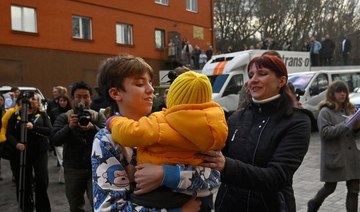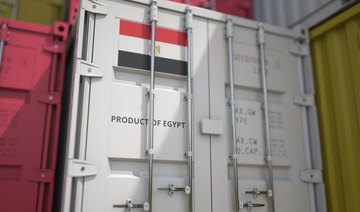THE HAGUE, Netherlands: Representatives of Ukrainian civil society and rights groups have visited an organization that uses high-tech DNA techniques to identify people who go missing in conflicts and natural disasters, a move intended to boost cooperation during the ongoing war in Ukraine.
The head of the International Commission on Missing Persons, a Hague-based group that operates a human identification facility, said Thursday that her organization faces unprecedented challenges as it seeks to collect DNA samples and evidence amid the fighting.
“I cannot think of another model whereby we’re working now actively to assist in investigations of missing persons cases while there’s an ongoing conflict,” ICMP Director-General Kathryne Bomberger told The Associated Press. “So, this does present a challenge.”
The people missing or unidentified following Russia’s invasion of Ukraine more than a year ago range from soldiers killed in battle to civilians killed in attacks by Russian forces. They also include children who were abducted and sent to Russia, a practice that led the International Criminal Court to issue an arrest warrant for Russian President Vladimir Putin and his commissioner for children’s rights.
The commission is close to finalizing an agreement with the Ukrainian government that would facilitate its work to pin down the identities of people who are missing or dead by gathering DNA from bodies and cross-referencing it with samples from family members.
Such an agreement would give the organization legal clarity when working with Ukrainian families.
“In a mass grave, which is a crime scene, you want to ensure that you’re working in line with the criminal procedure code, with other domestic legislation,” Bomberger said.
Experts from the commission have traveled to Ukraine to help identify the dead and opened an office in Kyiv. Their findings can give closure to families and also feed into investigations that aim to bring to justice perpetrators.
At its lab in The Hague, the commission’s technicians can extract DNA from tiny samples of bone and cross-reference them with samples provided by families of the missing.
Even the number of people missing in Ukraine dating not just back to Russia’s Feb. 24, 2022, invasion but to the start of the grinding conflict in eastern Ukraine more than a decade ago is far from certain.
“The issue of how many people are missing is not entirely clear,” Bomberger said. “There is information coming from the state itself, which we use as the basis of numbers, but we also recognize that the state has a need for confidentiality when it comes to the numbers of fallen soldiers who may be among the missing.”
Victoriia Solodukhina, who represented an organization called Nadia, which is Ukrainian for Hope, said she hopes to find out more about people missing since early in the conflict in eastern Ukraine. But she said for some family members, identification will come too late.
“We don’t even know whether somebody will look for them because their loved ones — their parents and relatives — are not here anymore,” she said.
“Time is our enemy,” she added.
Anna Popova, from Ukraine’s Nobel Peace Prize -winning Center for Civil Liberties, was among representatives of Ukrainian civil society who visited the commission’s headquarters and hi-tech DNA labs in The Hague this week as part of moves to ensure that families of the missing are made aware of the role they can play in the process of finding and identifying their loved ones.
“In Ukraine we have an extremely high number of missing persons,” she said through an interpreter. “We need changes in legislation so families of missing persons can defend their rights.”
She said the Center for Civil Liberties, and a project it helped establish called Tribunal For Putin to gather evidence of war crimes since the invasion last year, have received nearly 1,000 requests for help tracing people who went missing or were being held captive.
The International Commission on Missing Persons was established to help identify the missing and dead from the Balkan wars of the 1990s. It has a working relationship with the prosecution office of the International Criminal Court and crime-fighting agencies like Interpol and Europol to share evidence.
Funded by voluntary contributions from governments, the missing persons commission has worked at crime scenes and disaster sites around the world, including Syria, Libya and Iraq.
Bomberger said that, so far, the commission has not directly engaged with Russian authorities about Ukraine, but says there should be contact in the future.
“When the time is right ... there will have to be a time when this happens because it’s part of building peace,” she said.
Ukrainian groups learn about DNA use to identify war victims
https://arab.news/pqpph
Ukrainian groups learn about DNA use to identify war victims
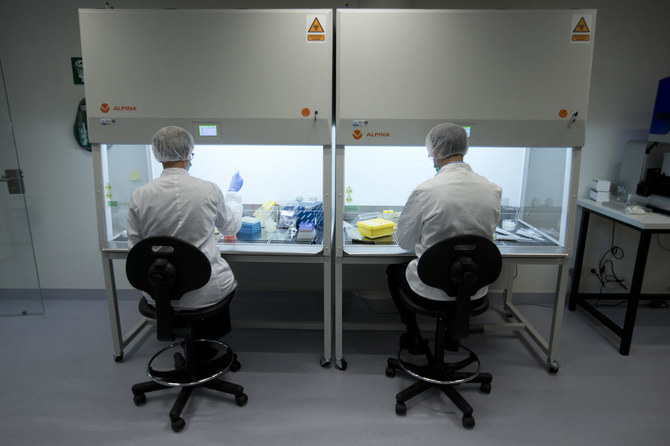
- The people missing or unidentified following Russia’s invasion of Ukraine more than a year ago range from soldiers killed in battle to civilians killed in attacks by Russian forces
- The commission is close to finalizing an agreement with the Ukrainian government
Opposition leaders in Kashmir accuse Indian government of sabotaging their campaigns
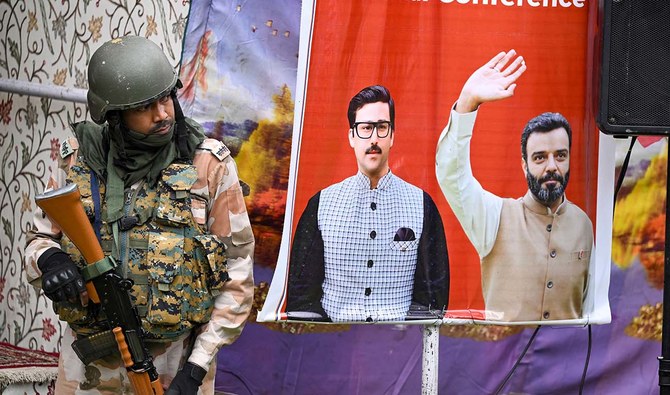
- Omar Abdullah says police canceled permissions for his rallies, asking him to reschedule without giving reasons
- Mehbooba Mufti of People’s Democratic Party also accused the police of not allowing her to hold campaign events
NEW DELHI: Opposition leaders in India’s troubled Kashmir valley have accused Prime Minister Narendra Modi’s administration of denying or canceling permissions to hold campaign events, to help his party’s “proxies.”
Omar Abdullah, a leader of the largest regional political party, the National Conference, said Modi’s government was trying to sabotage his campaign ahead of voting in the first of Kashmir’s three seats on Monday.
Modi’s Bharatiya Janata Party (BJP) is skipping elections in Kashmir for the first since 1996, which analysts and politicians in the region say belies his narrative of integrating Kashmir with the rest of the country and bringing peace and normality to the valley ravaged by a 35-year-old uprising against India’s rule.
In 2019, Modi revoked Jammu and Kashmir state’s partial autonomy, removed its statehood and divided it into two federally-controlled territories: Muslim-majority Kashmir with Hindu-dominated Jammu, and a mountainous Buddhist territory of Ladakh.
While the BJP has not fielded any candidate in Kashmir’s three seats, it has said that, as part of its grand strategy, it would instead support other smaller regional parties, without naming which.
In a letter to the federal poll watchdog, the Election Commission of India, on Thursday, Abdullah said the police, which are under the federal government’s control, canceled permissions for his rallies, asking him to reschedule without providing any reasons.
He said on social media platform X that it was done to help the BJP’s “proxy candidates.”
His rival Mehbooba Mufti, who heads the other regional political powerhouse the People’s Democratic Party (PDP), also accused the police of not allowing her to hold campaign events.
“This attitude of the police, in which they curtail our movement to support the proxy parties of the BJP, is against the guidelines of the Election Commission of India,” she said at a rally in Srinagar on Thursday.
V.K. Birdi, the police official responsible for Kashmir, did not immediately respond to a request seeking comment.
Both Abdullah and Mufti have said they were opposed to the BJP and would support an opposition Congress-led alliance of more than two dozen parties federally.
The state unit of the election watchdog has also asked PDP’s Srinagar candidate, Waheed ur Rehman Para to refrain from calling this election a “referendum” against scrapping of semi-autonomy of the region in 2019 in his speeches.
While Srinagar will vote on May 13, the elections in the other two seats will be held on May 20 and 25.
Nuclear-armed neighbors India and Pakistan control parts of Kashmir, but claim it in full, and have fought two of their three wars over the region.
India top court grants temporary bail to opposition leader Kejriwal to campaign in elections
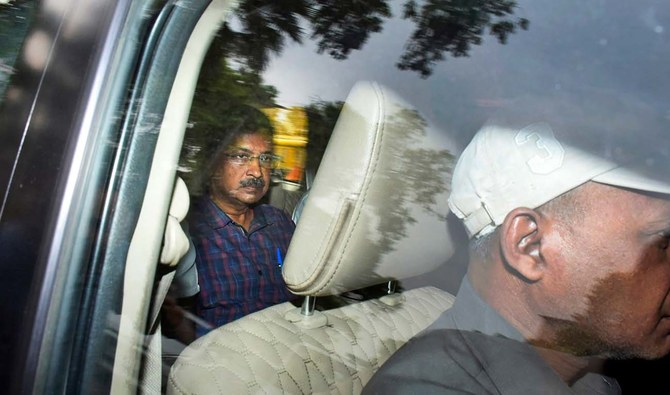
- Bail would last until June 1, last day of seven-phase vote, and Kejriwal would have to surrender on June 2
- Poll marred by charges that PM Narendra Modi’s government is using investigating agencies to hurt rivals
NEW DELHI: India’s top court gave temporary bail to Delhi Chief Minister Arvind Kejriwal in a graft case on Friday, allowing him to campaign in the ongoing general elections, boosting the opposition alliance of which he is a key leader.
The court said the temporary bail would last until June 1, the last day of the seven-phase vote, and Kejriwal would have to surrender on June 2.
The poll has been marred by charges that Prime Minister Narendra Modi’s government is using investigating agencies to hurt rivals, accusations the government denies.
The Enforcement Directorate, India’s financial crime-fighting agency, arrested Kejriwal — a staunch critic of Modi and a key opposition leader — on March 21 in connection with corruption allegations related to the capital territory’s liquor policy.
Kejriwal’s government and his Aam Aadmi Party have denied the corruption allegations. Modi and his Bharatiya Janata Party say that the investigating agencies are only doing their job and the government is not influencing them.
Kejriwal has been in pre-trial detention since April 1, and his wife Sunita has stepped in to campaign for his decade-old party in his absence.
India began voting on April 19 and elections to more than half the total 543 seats were completed with the third phase on May 7. The national capital territory will vote on May 25.
Voting concludes on June 1 and counting is set for June 4.
The Supreme Court, while hearing an appeal against Kejriwal’s arrest last week, said that it “may” consider granting “interim bail” or temporary bail to the high-profile leader “because of the elections” as the appeal against his arrest could take a while to conclude.
Kejriwal argued that he was arrested just before the vote to stop him from campaigning against Modi, who opinion polls suggest will win a comfortable majority and secure a rare third straight term.
His lawyer said Kejriwal is a serving chief minister, not a “habitual offender.”
ED lawyers argued that giving bail to a politician just to campaign will send a wrong message that there are different standards for them and other citizens. Kejriwal had to be arrested as he refused nine ED summons over six months to appear for questioning, they added.
The INDIA alliance of more than two dozen opposition parties has called the action against Kejriwal and other opposition leaders politically motivated to deny them a level playing field in the polls, accusations Modi and BJP reject.
Kejriwal’s arrest had drawn international attention, with Germany and the United States calling for a “fair” and “impartial” trial.
Philippines invites Saudi partnerships in halal industry, renewables
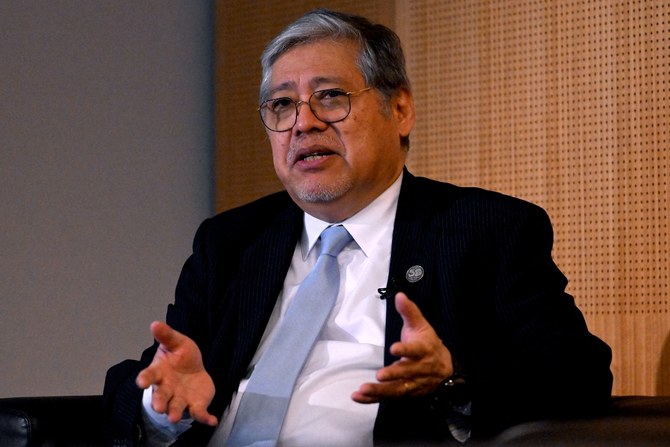
- Govt wants renewables to contribute 35% to energy mix by 2030
- It launched strategic plan to develop domestic halal industry in January
MANILA: The Philippines says it is open to expanding partnerships with Saudi Arabia in its top priority sectors, including renewable energy and the halal industry.
The use of renewable energy was announced as the main issue in the country’s climate agenda during President Ferdinand Marcos Jr.’s first state of the nation address in 2022.
Renewable energy contributes about 30 percent to the Philippines’ energy mix, which is dominated by coal and oil. The government seeks to increase it to 35 percent by 2030 and 50 percent by 2040, and make renewables more accessible to the public.
“Given the Kingdom’s role in the supply of conventional and renewable energy, the Philippines is open to possible partnerships in the field of renewables,” Foreign Affairs Secretary Enrique Manalo told Arab News this week.
An agreement to enhance cooperation in the field was reached in October, during President Ferdinand Marcos’ visit to the Kingdom at the invitation of Saudi Crown Mohammed bin Salman.
A business delegation accompanying the president signed investment agreements collectively worth more than $4.26 billion with Saudi business leaders.
“With Saudi Arabia’s role as a regional business and political hub, we wish to increase investments,” Manalo said.
“Further, amidst the region’s changing landscape and economic diversification initiatives, we aspire to expand our partnership in the fields of agriculture, tourism and the halal industry.”
In January, the predominantly Catholic Philippines — where Muslims constitute about 10 percent of the almost 120 million population — launched its Halal Industry Development Strategic Plan to tap into the global halal market, which is estimated to be worth more than $7 trillion.
The plan aims to double the industry’s output in the next four years, create 120,000 new jobs and attract $4 billion in investments by 2028.
Greece to bring in Egyptian farm workers amid labor shortage
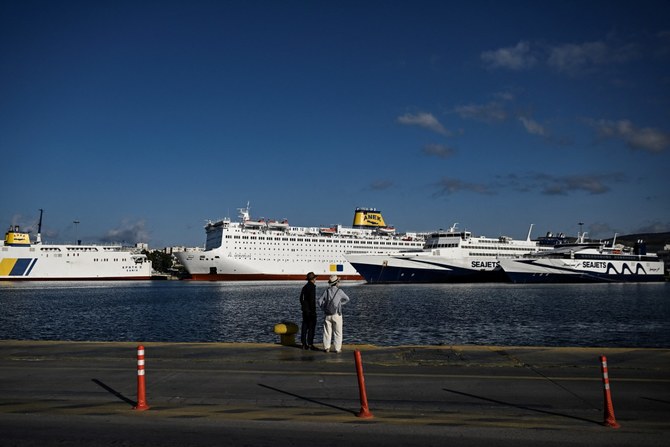
- Greece will take in around 5,000 seasonal farm workers under the 2022 deal signed with Egypt
ATHENS: Greece will start bringing in workers from Egypt this summer to take on temporary farming jobs under a deal between the countries to tackle a labor shortage, the migration ministry said on Friday.
After a decade of pain, the Greek economy is forecast to grow nearly 3 percent this year, far outpacing the euro zone average of 0.8 percent.
But an exodus of workers during Greece’s economic crisis, a shrinking population and strict migration rules have left the country struggling to find tens of thousands of workers to fill vacancies in farming, tourism, construction and other sectors.
Greece will take in around 5,000 seasonal farm workers under the 2022 deal signed with Egypt.
The countries have discussed expanding the “mutually beneficial” scheme to the Greek construction and tourism sectors, the Greek Migration Ministry said in a statement.
Migration has long been a divisive issue in Europe, but the plan had won broad support from employers groups keen to find workers.
Greek Migration Minister Dimitris Kairidis met Egyptian Labour Minister Hassan Shehata in Cairo this week and said the countries should also step up cooperation to fend off illegal migration flows in the region.
Egyptian officials have said their country deserves recognition for largely stopping migrants setting off from its northern coast across the Mediterranean to Europe since 2016.
The European Union this year announced a multi-billion euro funding package and an upgraded relationship with Egypt, part of a push to cut down on the number of migrants crossing over from North Africa.
Rights groups have criticized Western support for Egyptian President Abdel Fattah El-Sisi, who came to power a decade ago after leading the overthrow of Egypt’s first democratically elected leader.
India says Canada has shared no evidence of its involvement in killing of Sikh separatist leader
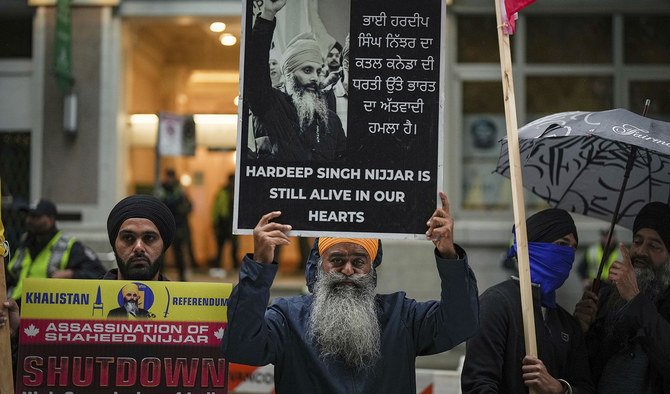
- Three Indian nationals who had been temporarily living in Canada were arrested on Tuesday in the June slaying of Hardeep Singh Nijjar
- PM Trudeau set off a diplomatic spat with India in Sept. when he cited ‘credible allegations’ of India’s involvement in the Sikh’s murder
NEW DELHI: India said Thursday that Canada has shared no evidence to back its allegation that the Indian government was involved in the slaying of a Sikh separatist leader in Canada last year, despite the recent arrests of three Indian men in the crime.
India’s External Affairs Ministry spokesman Randhir Jaiswal also reiterated India’s longstanding allegation that Canada harbors Indian extremists.
Three Indian nationals who had been living in Canada temporarily were arrested on Tuesday in the slaying last June of Hardeep Singh Nijjar in British Columbia. Canadian Prime Minister Justin Trudeau had set off a diplomatic spat with India last September when he cited “credible allegations” of India’s involvement in the slaying of the Sikh separatist. India rejected the accusations.
Canadian Mounted Police Superintendent Mandeep Mooker said after the men’s arrests that the investigation into whether they had ties to India’s government was ongoing.
Jaiswal said the two governments are discussing the case but that Canada has forwarded no specific evidence of the Indian government’s involvement.
Meanwhile, Jaiswal said New Delhi has complained to Canadian authorities that separatists, extremists and those advocating violence against India have been allowed entry and residency in Canada. “Many of our extradition requests are pending,” he said.
“Our diplomats have been threatened with impunity and obstructed in their performance of duties,” Jaiswal added. “We are having discussions at the diplomatic level on all these matters,” he said.
The three Indian men arrested in Canada haven’t yet sought any access to the Indian diplomats there, Jaiswal said.
The three — Kamalpreet Singh, 22, Karan Brar, 22, and Karanpreet Singh, 28 — appeared in court Tuesday via a video link and agreed to a trial in English. They were ordered to appear in British Columbia Provincial Court again on May 21.
They were arrested last week in Edmonton, Alberta. They have been charged with first-degree murder and conspiracy to commit murder.



